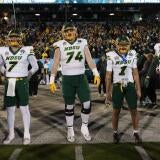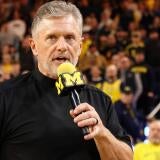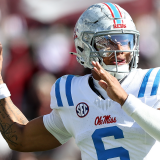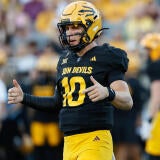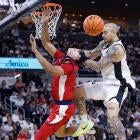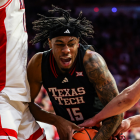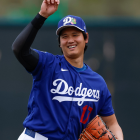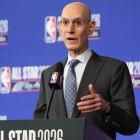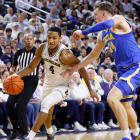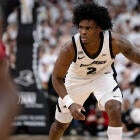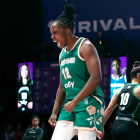
Is Kiffin right to blame defense for 'underappreciation' of Barkley?
With his starting quarterback facing scrutiny of his own in the wake of the NFL Combine, Kiffin's critique of USC's collapse got a little more specific.
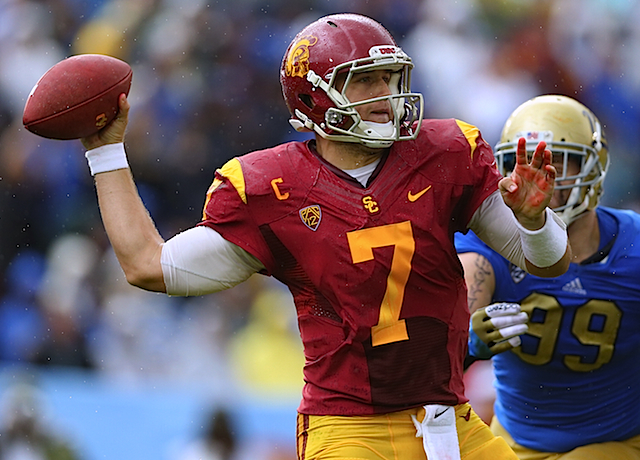
Barkley was 34-13 in four years as USC's starting quarterback. (Getty Images)
There's not much point in denying USC was the most disappointing team in college football in 2012 -- after opening the season ranked No. 1 in the AP poll, the Trojans were arguably the most disappointing preseason frontrunner in at least 50 years -- and to his credit, Lane Kiffin hasn't tried. As head coach, Kiffin has publicly accepted the blame for his team's 7-6 flop, punctuated by a 1-5 finish that set the temperature on his chair to "broil." This week, though, with his starting quarterback facing scrutiny of his own in the wake of the NFL Combine, Kiffin's critique got a little more specific.
Going on the record Wednesday to defend Matt Barkley from skeptical pro scouts, Kiffin not-so-subtly suggested to ESPN Los Angeles there is a "huge underappreciation" of Barkley's talent due to the team's dismal finish, and that his regression from can't-miss, top-10 prospect after his junior season to borderline bust as a senior was the direct result not of an individual failure by Barkley, but of chronic failures on the other side of the ball:
"I think he's going to be a great starting quarterback in the NFL, and the film shows it. The plays he makes, all the throws he's made here, the leadership qualities ... I've said this before: If Matt Barkley had the defense that Matt Leinart and Carson Palmer had, Matt Barkley would have won the Heisman Trophy just like they did. He would have had the winning records they had."
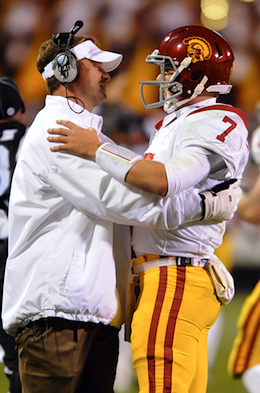 The 2011 Trojans went 10-2. (USATSI) |
What Kiffin did not mention, of course, was that the defense in question -- one that finished 69th nationally against the run and 60th in total yards allowed -- was under the $1.5 million oversight of his father, Monte, whose NFL-informed schemes were routinely undone by mobile spread quarterbacks. By now, he doesn't have to, having already made the point loud and clear by accepting the elder Kiffin's resignation and overhauling the rest of the staff since the end of the season. On this point, at least, Lane has put a little money where his mouth is.
And as for his other point, re: Barkley, it may not be as far off the mark as avowed Kiffin haters assume. At full strength, the offense was frequently as good as advertised -- even when it wasn't good enough to overcome persistent issues on the other side.
That was true even through the late collapse. Against Arizona on Oct. 27, the Trojans put up 36 points on 618 yards of total offense (493 passing), only to watch the Wildcats rip off 28 consecutive points in the second half of a come-from-behind, 39-36 upset. A week later, the offense hung 51 points on Oregon in the course of another 600-yard afternoon, but never stood a chance opposite arguably the worst defensive performance in USC history. Barkley finished with 484 yards, five touchdown passes and a 163.3 efficiency rating in a 62-51 defeat.
After a disastrous start against UCLA, the Trojans still finished with 513 yards (301 passing) on more than seven yards per snap, and nearly rallied out of a 24-0 hole before running out of gas in a 38-28 defeat. The comeback effort in the Rose Bowl ended with Barkley on the turf, his shoulder separated by a blindside hit that ultimately ended his college career. As often as he was forced into must-pass situations in shootouts, it was a predictable fate.
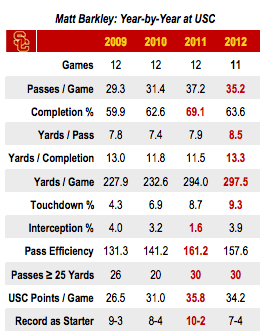 |
In the same vein, even when the offense was at its worst, at least part of the blame could be shifted to key injuries. In their first loss, a 21-14 flop at Stanford in September, the offensive line crumbled in the second half with All-Pac-12 center Khaled Holmes sidelined by injury, leaving Barkley and the running backs to fend for themselves under consistent pressure. Anemic efforts against Notre Dame in the regular season finale and Georgia Tech in the bowl game came with Barkley nursing the injured shoulder and his replacement, redshirt freshman Max Wittek, looking very much like a redshirt freshman seeing his first significant action. It was never so dire when the starting lineup was intact.
Excluding the two games Barkley missed, in fact, the 2012 Trojans averaged slightly more yards and points per game than the 2011 edition that was hailed as one of the most explosive attacks in the nation; they also averaged more yards per play for the season and had more plays covering at least 20 yards. Personally, Barkley put up nearly identical numbers in both seasons in terms of yards, touchdowns and efficiency. They were substantially the group they were supposed to be.
On the other hand, the two areas in which Barkley and the offense a whole clearly declined were two of the most critical: converting on third downs and taking care of the ball. The third-down rate, one of the best in the nation in 2011, plummeted last year to a meager 34.2 percent, and barely cracked 30 percent when the Trojans put the ball in the air. (That number suffers most heavily from the loss at Stanford, where USC was 0 for 12 on third downs.) Worse, the Trojans committed a ghastly 34 giveaways, more than all but three other teams nationally, and finished in the red in turnover margin in five of six losses.
Barkley, so averse to mistakes as a junior, more than doubled his interceptions, from seven to 15, despite attempting fewer passes; down the stretch, he was picked off at least twice in each of his last four starts, three of them Trojan losses. As a team, USC was minus–11 in turnover margin over the last five games of the regular season alone.
It is certainly true Heisman voters (along with the general public) judge quarterbacks at least as much by their team's record as by their individual stat line, and it is also true that quarterbacks who benefit from a strong defense and/or run support -- two luxuries Barkley did not have as a senior -- face fewer situations that are likely to result in interception or injury. Though he's had his moments, Kiffin is hardly considered a genius in the play-calling department. Under different circumstances, Barkley may have been the indomitable hero everyone expected in 2012, and then some. Under the actual circumstances, the best he can hope for is a legacy of what might have been.



